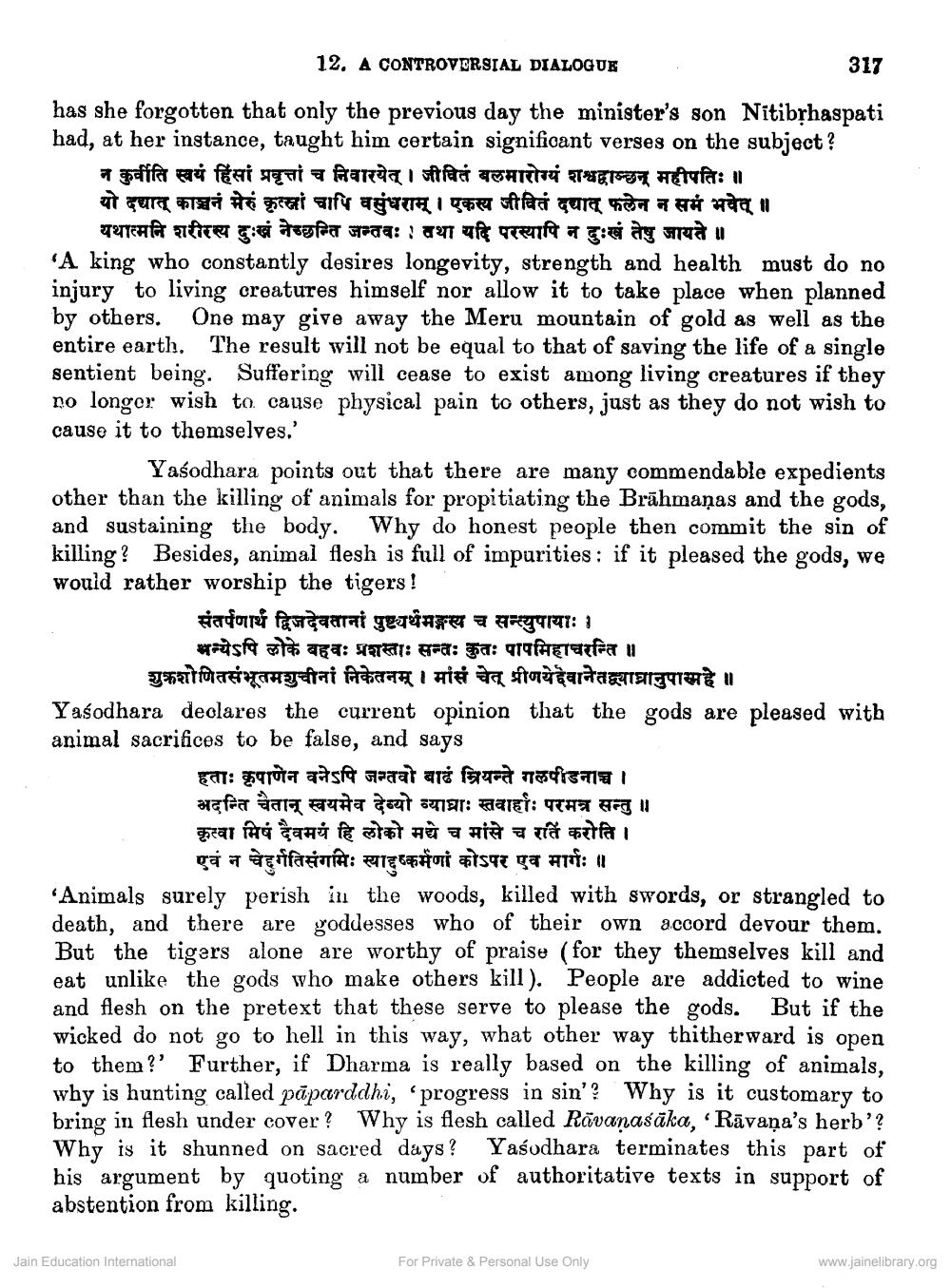________________
12. A CONTROVERSIAL DIALOGUE
has she forgotten that only the previous day the minister's son Nitibṛhaspati had, at her instance, taught him certain significant verses on the subject?
न कुर्वीति स्वयं हिंसां प्रवृत्तां च निवारयेत् । जीवितं बलमारोग्यं शश्वद्वान्छन् महीपतिः ॥ यो दद्यात् काञ्चनं मेरुं कृत्स्नां चापि वसुंधराम् । एकस्य जीवितं दद्यात् फलेन न समं भवेत् ॥ यथात्मनि शरीरस्य दुःखं नेच्छन्ति जन्तवः । तथा यदि परस्यापि न दुःखं तेषु जायते ॥
'A king who constantly desires longevity, strength and health must do no injury to living creatures himself nor allow it to take place when planned by others. One may give away the Meru mountain of gold as well as the entire earth. The result will not be equal to that of saving the life of a single sentient being. Suffering will cease to exist among living creatures if they no longer wish to cause physical pain to others, just as they do not wish to cause it to themselves.'
Yasodhara points out that there are many commendable expedients other than the killing of animals for propitiating the Brāhmaṇas and the gods, and sustaining the body. Why do honest people then commit the sin of killing? Besides, animal flesh is full of impurities: if it pleased the gods, we would rather worship the tigers!
संतर्पणार्थं द्विजदेवतानां पुष्ट्यर्थमङ्गस्य च सन्त्युपायाः ।
अन्येऽपि लोके बहवः प्रशस्ताः सन्तः कुतः पापमिहाचरन्ति ॥
शुक्रशोणितसंभूतमशुचीनां निकेतनम् । मांसं चेत् प्रीणयेद्देवानेतद्व्याघ्रानुपास्महे ॥
317
Yasodhara declares the current opinion that the gods are pleased with animal sacrifices to be false, and says
gar: gqùa aðsût araat ar¿ faurà noficma | अदन्ति चैतान् स्वयमेव देव्यो व्याघ्राः स्तवाहः परमन्त्र सन्तु ॥ कृत्वा मिषं दैवमयं हि लोको मद्ये च मांसे च रातें करोति ।
एवं न चेद्दुर्गतिसंगमिः स्याद्दुष्कर्मणां कोऽपर एव मार्गः ॥
Jain Education International
'Animals surely perish in the woods, killed with swords, or strangled to death, and there are goddesses who of their own accord devour them. But the tigers alone are worthy of praise (for they themselves kill and eat unlike the gods who make others kill). People are addicted to wine and flesh on the pretext that these serve to please the gods. But if the wicked do not go to hell in this way, what other way thitherward is open to them?' Further, if Dharma is really based on the killing of animals, why is hunting called paparddhi, 'progress in sin'? Why is it customary to bring in flesh under cover? Why is flesh called Ravanasāka, 'Rāvaṇa's herb'? Why is it shunned on sacred days? Yasodhara terminates this part of his argument by quoting a number of authoritative texts in support of abstention from killing.
For Private & Personal Use Only
www.jainelibrary.org




